NRL 2020: Broncos coach Anthony Seibold fighting a war with himself, Paul Kent
The game is littered with short-term coaches. Smart football men who finally got their chance but discovered all too late that coaching is about more than just the coaching, writes Paul Kent.
Sport
Don't miss out on the headlines from Sport. Followed categories will be added to My News.
Anthony Seibold is defiant at the moment.
He is a man at war and when the guns come down and he surveys what wreckage is left he will notice an absence of casualties. This war he fights is mostly with himself.
Seibold, silently angry, used Thursday’s close call to Manly to bite back at a week’s worth of criticism in the post-match press conference.
“The people who criticise our club, myself, the players, they’re not in with us, anyway,” he said.
“They’re not on board with us, anyway. So if you spend your life trying to please other people you’re going to be disappointed.”
Yet Seibold is already spending too much of his life doing exactly that. He cares even as he says he does not.
Kayo is your ticket to the 2020 NRL Telstra Premiership. Every game of every round Live & On-Demand with no-ad breaks during play. New to Kayo? Get your 14-day free trial & start streaming instantly >
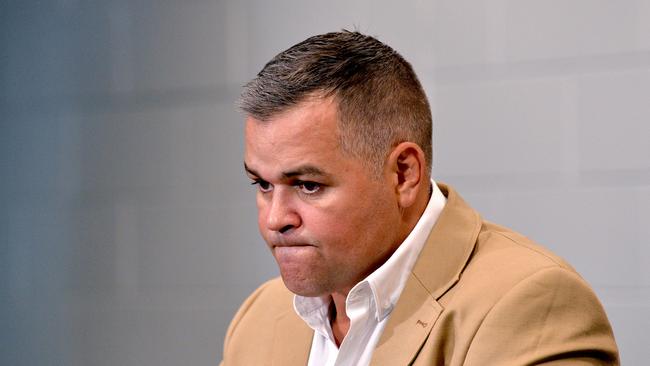
The pity of the Broncos is most of those not on board are no longer there because Seibold gave them the heave-ho sometime much earlier in their relationship, even though some of them like former Broncos Gorden Tallis and Glenn Lazarus long ago earned a full-time seat.
It makes this a crucial time for the Broncos’ coach. He has a long-term contract but that means little if he continues to sell the job as a club doing in the middle of a rebuild when the chief executive states the Broncos are a top four team.
The game is littered with short-term coaches. Smart football men who finally got their chance but discovered all too late that more went into coaching than X’s and O’s and video presentations.
Another coach in similar territory is St George Illawarra boss Paul McGregor.
Asked what he would do after the Dragons’ loss to Canterbury on Monday McGregor, who survived a board meeting over his job the following day, said: “Right now I’ll have a debrief with the coaches, watch video until three’o’clock in the morning, get up and meet the coaches at 7.30am and the players will come in at 12.”
It is barely true that sometime around 2am that night a television set sailed out of a window and into the front yard of a Wollongong home but who knows what McGregor saw in the early hours of watching the Dragons lose to Canterbury again that could turn them around when they take on Cronulla tomorrow.
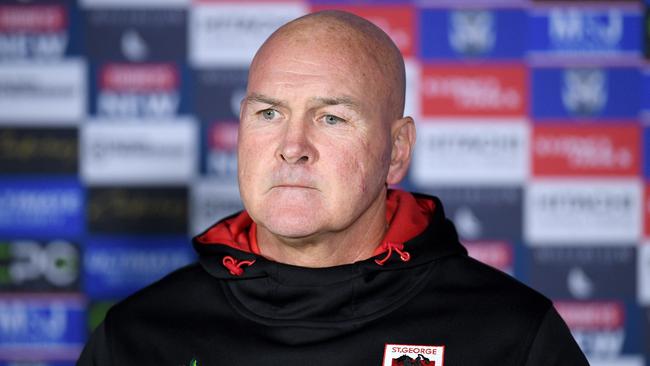
Sometimes, coaches are their own worst enemy. They get the job often because they have shown a capacity to work harder than anybody else in the room and, often, it is a large reason why they are quickly out of a job.
McGregor works like a drover’s dog, and there is little doubt he would have poured over the smallest details in his video review looking for each small improvement that could be found.
You could make an argument the answer might not even be there, though, and is instead in tomorrow’s game itself.
The Dragons play the Sharks in their local derby, a rivalry that has been mostly bitter since the late 1960s when Cronulla first entered the premiership.
If the Dragons are to surge back to form it might be less on whatever McGregor saw in the early hours than on the back of the kind of emotion brought about by two weeks of severe criticism and the in-built passion the derby provokes.
Football isn’t all about technique and theory. Aggression and temperament are equally vital.
It is the difference between working harder and working smarter and it is too often a lesson that too many coaches learn the hard way.
Anthony Griffin grew as a coach the moment he got sacked by Penrith and was finally able to stand back from the chaos and see what actually happened.
Griffin later realised that he believed coaching was all about coaching, when it is only part of the job.
He is a better coach now than he was at Penrith or Brisbane, like Trent Barrett will be a better coach next time around, too, and Geoff Toovey will be too.
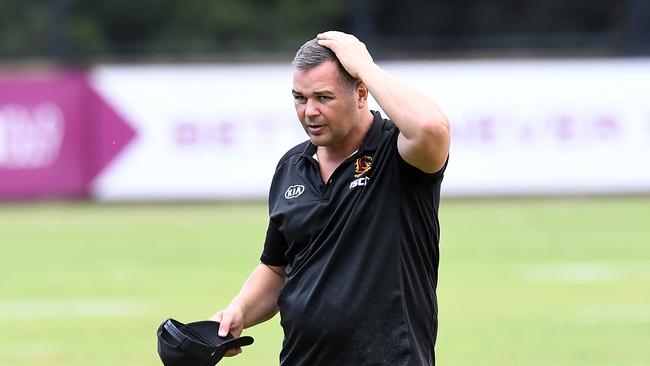
The game is filled with coaches who learned the key to coaching once it was too late.
Tomorrow’s game against Cronulla will give a big insight into where McGregor is going with his coaching, like Thursday’s did with Seibold.
It is hard for young coaches to tell themselves that the answer is not always more hard work, or another fight, when hard work and an appetite for the battle is what got them where they are.
Countless sports are played around the world where trying less is trying smarter. Where trying harder is counter productive.
When Greg Norman took his hands off his golf clubs and slowly applied them to his neck on the final round at Augusta in 1996, many claim that Norman had lost it mentally.
The pressure got to him and he choked, unable to get his head back into it.
Norman went into the final round leading the Masters by six strokes. He lost by five shots, the final round an 11-shot turnaround.
Analysts later went over Norman’s game and realised that rather than panicking under pressure, rushing his shots, Norman actually went the other way.
His preparation got slower. He addressed the ball much longer in the final round than he did in any of the three previous rounds and, the deeper the trouble he was in, the longer he addressed the ball.
Norman, they believed, was literally overthinking his way out of contention.
When a fighter bites down on his mouthguard and determines to knock his opponent out he rarely does. Tension through the muscles make him stiff and slow.
Mike Tyson never worried about hitting harder than his opponent. He was always about staying loose, knowing that when he was loose he was faster. The speed brought the knockouts.
Bart Cummings could never talk to his horses, though they often listened. Cummings had a simple way to understand how his horses were feeling.
The trainer simply checked their feed bins each morning. If the bin was empty it meant the horse was feeling good and had eaten up, at least that’s what his intuition told him, so he poured more work into them.
The moment Cummings saw a little grain left in their bins he recognised a horse under stress and pulled back the work.
Young coaches see the feed in the bin and think they must pour on more work to give them an appetite.
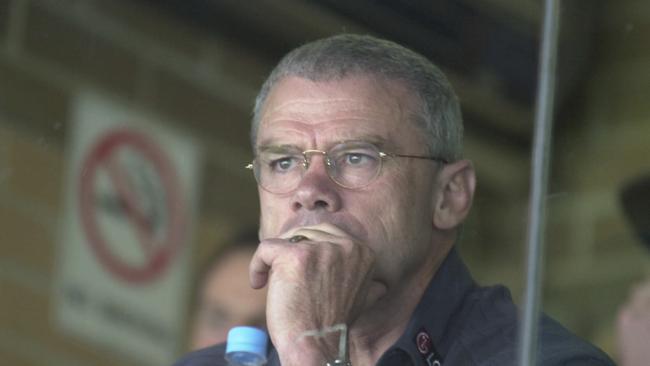
When the Super League war tore through Canterbury in 1995 hostilities between teammates got so bitter they could barely talk to each other.
A couple of ordinary weeks of footy followed.
Finally a meeting was called at Canterbury Leagues Club and coach Chris Anderson ordered bar staff to keep serving for as long as the players were standing and talking.
Anderson declared his players were not going home until they resolved their problems.
Hours later they were still unresolved, so they stayed longer.
Finally the temperature warmed, though, and opinions were delivered honestly, and with honesty came understanding and finally common ground.
The Bulldogs were then ordered to meet every Monday at a pub where there was one rule: nobody was allowed to talk footy. They had to find other topics to bond over, and over time they found them and found each other.
The Bulldogs won the premiership that year.
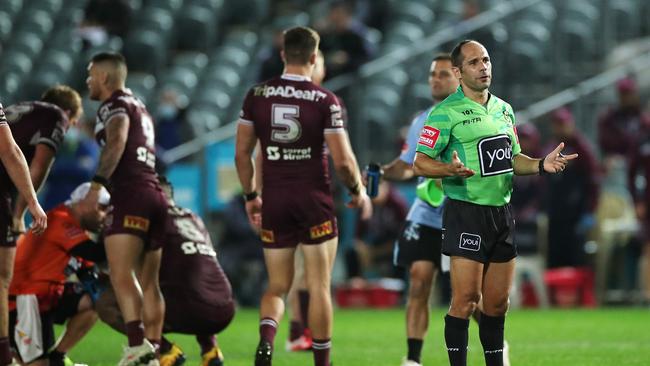
SHORT SHOT
A week after a game deciding call in the NRL, referee Ashley Klein was faced with another decision late in the game that was likely going to decide the game.
Klein did not hesitate to penalise Pat Carrigan for stealing the ball from Jake Trbojevic and giving Manly the chance to kick the penalty goal that ultimately won them the game.
Broncos coach Anthony Seibold was variously described as “fuming” and “angry” after the game but got it wrong.
“It’s a really tough call, it was a one-on-one strip so if he had have called ‘held’, what normally happens is the guy gets to play the ball again,” Seibold said.
“To lose a game like that is disappointing because I just didn’t think it was a penalty.”
Unfortunately for Seibold, it is a penalty every day of the week, including Thursdays. Seibold has got the rule mixed up with players passing after the referee has called held, which was introduced to protect the ball carrier from being smashed late in the tackle.
Stealing after the call of held has always been a penalty, as it was on Thursday night.
The most heartening aspect to it was that Klein had the confidence to make the call given it would most likely decide the outcome, as it did.
Refs in the past have been accused of keeping their whistles in their pockets in such circumstances, happy to avoid any controversy.
The whistleblowers have been superb since the competition resumed.
Yes, there was the error from the week before, but it has had no impact on their ability to make decisions ever since.

